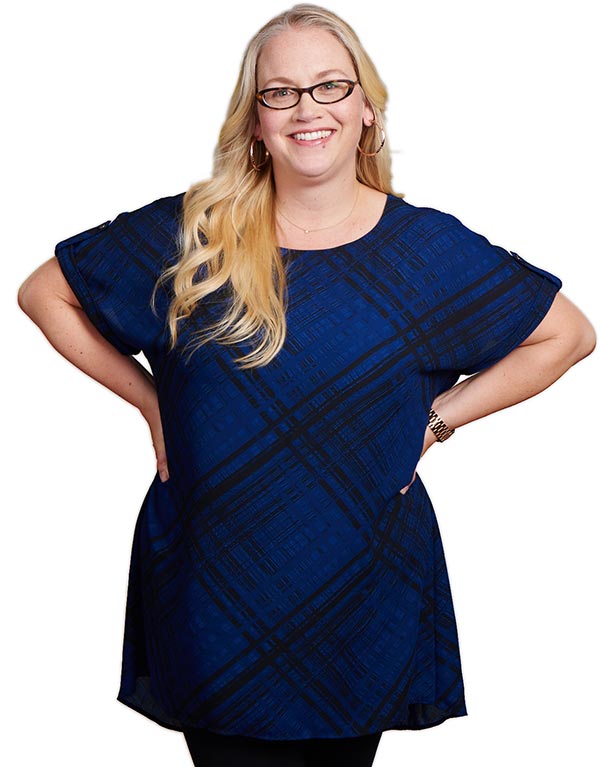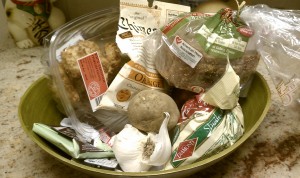A new HealthyGirl.org reader left a comment the other day asking about food diaries: “I would love to hear more…concerning food logs. I’m wondering if food logs are triggers or helpful for binge eating.”
I’ve used food diaries in a couple of different ways-and they’ve been incredibly helpful for me in my recovery. When you’re in the midst of an eating disorder you can’t always trust your own thinking, so writing down what I ate provided a necessary reality check. When I first started…a food diary, I would write down what I ate at the end of the day. Seeing a binge in black and white helped me get a true picture of just how much food I was actually eating-it helped me remember that this was serious business, and I needed to get better.
It also helped quiet that little “you suck” voice in my head that would pipe up every so often on days when even though I didn’t binge, I felt “fat” or weirdly guilty about my eating. I could look at exactly what I ate and see for myself that, while perhaps I hadn’t made the healthiest choices in each instance, I hadn’t binged. That helped me let go of the baseless guilt.
What was even more helpful for me, though, was writing my food down before I ate it. As I went along in my recovery, someone from my support group recommended that I plan my food out in the morning and write down what I was planning to eat. It allowed me to check in with my belly, with my tastebuds, with my body and decide what I wanted and needed, before the day had a chance to make me stressed or anxious.
It also took away some of the obsessing. I used to spend a half hour trying to figure out what to have for a snack: Should I? Shouldn’t I? What’s the right thing to eat? What’s the bad choice? If I planned in advance, whether it was pretzels and hummus, a pack of cashews, an apple or a cookie, I’d already decided what I was going to eat at snack time. No waffling, obsessing or in-the-moment choice-making necessary.
I did that for about two years, and it was one of the smartest moves I made. In fact, I just decided yesterday to start planning my food in the morning again for a while. I’ve been so busy (and yes, stressed) lately that I’ve been noticing some pretty strong emotional food cravings, and I’ve had some urges to binge. So, I’m going back to that tool for a bit, to help me clear food thoughts from my head and get me back to reality.
(Another thing I like about food diaries and planning your food in the morning: It gets rid of some of the lingering guilt I may have around “bad” foods. Something about actually planning, in advance, to have a piece of chocolate cake makes that mean “You shouldn’t eat that!” voice quiet down.)
Have you ever used a food diary or planned your food? Did it help? Or did it make you obsess even more?
xo…Sunny
![]() Tweet This
Tweet This
[photo]




Food diaries are especially great if you have a tendency to skip meals, but want to be eating a solid 3 meals and 2 snacks per day.
Tracking my food has both helped and wrecked my relationship with food at different points in my life. I lost over 90 pounds planning my meals/snacks ahead of time, but after I reached my goal weight, continuing to track my food made me anxious, especially if I found myself eating something that wasn’t part of that day’s “plan.” And when that happened, I quickly went into binge mode because I figured I already screwed up, so may as well keep going.
Now that I’m in recovery, I’m finding that practicing mindful eating and being better aware of hunger signals makes me a lot less stressed about food. It took me over 2 years to lose the weight and sometimes I was so strict with my food intake that all of that planning and tracking eventually backfired (mostly because I was tracking calories and points too, not just the food itself).
Today, I still pre-plan meals to an extent (kinda have to since I eat lunch and snacks at work), but I just make sure to give myself a good variety of options in case I feel like eating something different than what I originally planned for earlier in the day. This ensures that I’m satisfied, but also keeps me from feeling guilty.
It’s one of those things that really depends on the person. If you’re looking to try something different, tracking food might be a good option. But if it starts to make you obsess about food even more, simply stop. No need in putting unnecessary stress on yourself! (Wish I knew this months ago, but oh well. Live and learn, eh?)
I have a love hate relationship with food diaries. I did them while on the diet (and even now I’ve tried to do them) but I will log my morning food and then just put it out of my mind for the rest of the day.
I’m still looking for that magic way to motivate me to write what I eat.
I’ve never had a food diary, because I have an unfortunate capacity to remember everything I eat (and the calories from them), even if I don’t want to-but starting a food blog certainly helped me. Kind of the same principle, but instead of listing everything I eat, I put effort into making pretty, tasty meals that I can be proud to share with others.
Tamara, I just started a blog. Mainly it is to talk about my goal of running the Disney marathon in 2012, but I’ve been debating whether or not to log my meals as well. Do you find it easy to track your food on the blog?
I don’t know. Personally I find that I’m more enclined to binge when I keep a food diary.. Maybe it’s just a coincidence or because I notice binges more when I write them down, but I think it also may have to do with the fact that when I force myself to write my meals down, I also put a lot more pressure on myself to eat perfectly, and I obsess over every little indulgence.. So I guess my mind may ‘rebel’ itself against that pressure and binge instead. (If that makes any sense at all.. )
But the idea of writing your planned meals down at the beginning of the day sounds really interesting and helpful. I may just have to try that one.
Olivia- I feel the same way! Sometimes the food log/diary helps me but other times I feel like it can trigger a binge when I am “over” my calories or I eat a “bad” food!
I tried food journaling for about a month and had to stop. At first it was very helpful to see what exactly I was putting in my body, but it wasn’t long before I found myself obsessing more over every calorie. Towards the end it became a game of “beating my score” from the day before. It turned into something that was more harmful than helpful for me.
I definitely think that a food diary should NOT include numbers!!! NO CALORIES FOR SURE.
I was obsessed with food diary for the last 8 years. I’m not writing what i eat since November and it feels right. I am learning to listen to my body and not calculating all those numers and it’s a bit scary after all this time, but i know this is the best way for me to recover from binge eating.
I don’t think it is the right thing for me.
I would also try to eat less that the day before and knowing myself, I would probably end up having one meala day.
Then I would try to lie to myself, skip some entries, eat some more, write something less, get frustrated and binge, then burn the diary, cry, and try to start all over again…:)
I rather stick to having normal meals through out the day, and if something unplanned happens, just forget about it and move on, not have it on paper and feel guilty for longer.
That sounds like a good idea but I am too lazy to keep a food journal. I never kept a diary growing up because I would write one day and remember I had a diary two months later. lol I know that if I did keep a food journal I would probably become obsessed with it and I don’ t that to happen.
having a food diary made everything worse for me unfortunately. seeing the writing made me obsess over it constantly- if i forgot to bring it with me i would panic. it also made me constantly want to carry a calorie counter around so i could calculate everything immediately. however, i can see how it can be helpful at times too though!
I occasionally keep a food diary and like everyone else on here, sometimes it’s helpful and sometimes it’s not.
On the good side, when I’m faithful about writing down my food, I’m usually not bingeing. In that way, I consider a food diary to be one of the indicators about whether I’m being healthy - if I’m regularly exercising, writing down my food and drinking enough water, chances are good that I feel great about myself and I’m not bingeing. It’s also been a good tool to stop a one-time binge from turning into a multi-day/week/month episode. Last good thing - I find that I like knowing what I’m putting in my body, and it helps me make sure I get two servings of fish a week and take my vitamins.
On the negative side, I find that it sometimes interferes with eating mindfully. For instance, if I have planned to eat a chocolate fudge bar for dessert after dinner, I don’t stop to listen if my body is still hungry. I eat it just because I’m “allowed” to in the plan. I can also get obsessive about a food diary pretty easily. I use an online version that has lots of bells and whistles (track if you’re getting enough calcium in a week, track your intake vs calorie burn, etc.) I can spend hours lost in the numbers, which is such a waste of time.
Last thing that really jumped out at me in this string of comments is what Olivia said about rebeling. Sometimes I just get so frustrated with all the things I “have to” do, I just want to get rid of all them. The food diary can be one of those things, but I’ve started to get better about giving it some perspective. And when I feel out of control about it, I can remind myself the stakes are not that high and I don’t need to be perfect about recording my food.
I find the topic of food diaries quite emotive.
I have recently made another attempt at monitoring my food intake, and whilst it is useful in spotting patterns in my eating, I have found that it largely ends up with me feeling guilty that I’ve not done it correctly; that I’ve missed something by not being able to do it on the spot; that I’ve failed because I eventually give up on it.
It also harks back to when I became anorexic and monitored my eating and exercise obsessively. I kept those little books for quite a while and am still unsure whether I might find them in the bottom of some drawers at my Dad’s house.
The jury’s out for me on whether I will need to deploy the food diary again, as I am getting to a point where I’ve started to work on me, and now I want to work on my body and health. I am wondering whether, rather than monitor what we eat, it might be better to monitor how we feel? If we knew how we felt and why, maybe we could come up with alternatives other than food to fix it?
[…] reading just one page a day, every morning at the same time to set up a healthy routine?), using a food and hunger journal (not everyone finds them helpful, but I did), and support groups (have you ever tried a […]
[…] not binge. I had been going to my binge eating support group meetings for several months, and had a “food plan” in place that was really liberal and enjoyable, but didn’t include midnight […]